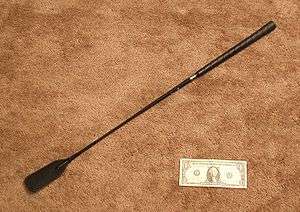Crop (implement)

A crop, sometimes called a riding crop or hunting crop, is a short type of whip without a lash, used in horse riding, part of the family of tools known as horse whips.
Types and uses
A modern crop usually consists of a long shaft of fiberglass or cane which is covered in leather, fabric, or similar material. The rod of a crop thickens at one end to form a handle, and terminates in a thin, flexible tress such as wound cord or a leather tongue, known as a keeper. The thin end is intended to make contact with the horse, whilst the keeper prevents the horse's skin from being marked. The handle may have a loop of leather to help secure the grip or a 'mushroom' on the end to prevent it from slipping through the rider's hand.
The length of a crop is designed to allow enough leverage for it to be accelerated rapidly with a controlled flick of the wrist without causing the rider balancing problems. Thus, a true crop is relatively short.
The term "whip" is a more common term that includes both riding crops as well as longer types of horse whips used for both riding and ground work. A whip is a little slower than a crop, mostly due to having slightly greater length and flexibility.
In equestrianism
Crops are principally designed to back up the natural aids (leg, seat and voice) of a rider,[1] but may also be used as a reprimand by more experienced riders,[2] for example to discipline a horse for refusing a jump[1] or other types of disobedience. However, care must be taken not to desensitize the animal to the stimulus.[2]

- Dressage whip is a true whip, longer than a crop, (up to 43 inches, including lash or popper) for horse training, allowing a rider to touch the mount's side while keeping both hands on the reins.
- Hunting whips are not for use on the horse, but have a "hook" at the end to use in opening and shutting gates without dismounting, as well as a long leather thong to keep the hounds from coming near the horse's legs, and possibly getting kicked.
Other uses
Weapon
Crops can be carried as a weapon. In the Sherlock Holmes series of novels and short stories, Holmes is occasionally said to carry one as his favourite weapon (e.g., "The Adventure of the Six Napoleons"). Specifically, it is a loaded hunting crop. Such crops were sold at one time. Loading refers to the practice of filling the shaft and head with a heavy metal (e.g., steel, lead) to provide some heft.[3]
Fetishism
Crops may sometimes be employed by sado-masochistic tops as an implement to "tame" their sexual partner. Art deco sculptor Bruno Zach produced perhaps his best known sculpture—called "The Riding Crop" (c. 1925)—which features a scantily clad dominatrix wielding a crop.[4]
See also
References
- 1 2 "Equine Training - Riding Aids Overview" Equestrian Outreach, 2003
- 1 2 Lethbridge, Emma. Knowing Your Horse: A Guide to Equine Learning, Training and Behaviour p. 113
- ↑ "loaded hunting crop".
- ↑ "Bruno Zach's 'Riding Crop Girl' hits World Record $150,602 at Bonhams art auction". justcollecting.com. Retrieved 27 June 2015.
